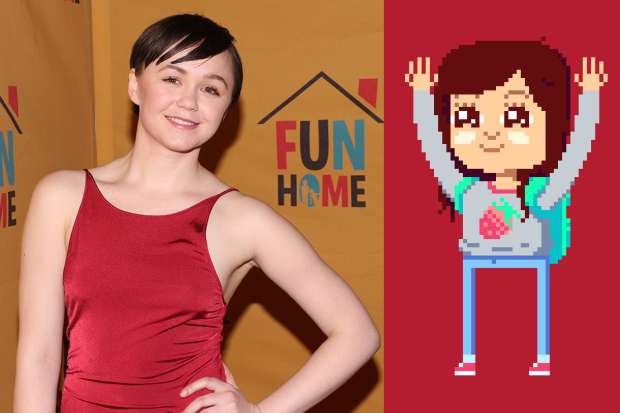Broadway Stars and Gamers Unite in Peter Panic, a Video Game Mega-Musical
Up-Up-Down-Down-Left-Right-Left-Right B, A, Start…Belt?
Unless you like to crank showtunes during Mario Kart parties, it's rare to have a Broadway-caliber cast album underscore your gaming sessions. James Marion, however, has blended the disparate worlds in a mini-game musical called Peter Panic, featuring a full score by composer Benjamin Bonnema. Tony-nominated Fun Home star Emily Skeggs and Spring Awakening veteran Gideon Glick are just two of the Broadway mainstays lending their voices to the project, now available for free in the App Store with an accompanying soundtrack on iTunes.
A theater practitioner-turned-game-developer, Marion earned a BA in theater from Rutgers and an MFA in Game Design from NYU. Peter Panic, which grew from a thesis project, is now potentially a bridge between his two beloved (and surprisingly similar) communities — and one he hopes will convince a few avid gamers to give Sondheim a chance.

How would you describe Peter Panic?
There was this game when I was kid called WarioWare. It was a collection of tiny mini-games about three or four seconds each and it was my favorite game when I was a kid. [When] I realized I didn't like it anymore, I was so sad. So my design goal was, "I want to make what I thought this game was when I was a kid." So that's basically what Peter Panic is. It's about forty mini-games of four seconds each and they're bunched into little worlds based on location. There's also a show you put on, which is really fun — a fully scored mini-show inside this show. That's the main gameplay.
How exactly do you make a musical out of a video game?
Every level has an introduction and an ending that are musical. They adapt based on how well you do. The whole thing is scored like a Broadway musical, which is the really exciting part to me. I keep having to remind myself that that's weird, because I forget, and then I show the game to someone and they're just baffled by it. But the whole thing sounds like a big British mega-musical. Over the last year-and-a-half I've shown the game at countless high schools around New York, and there are all these kids you wouldn't expect to like musicals and they kind of get tricked into liking it because it's a game.
What's your own theater background?
I started doing theater when I was maybe fifteen…and I loved it. When I went to Rutgers my initial plan was to major in English and Computer Science. And I took one computer science class, and I was like, "Nope." [laughs] So I [thought], "Well, I love theater. I'm gonna start trying to get into that in a real professional way." So I started the theater BA program at Rutgers.
How did you transition from that to video game design?
I was never quite good enough to perform in regional theater shows. Performing wasn't really my thing — I was mostly stage managing. But as I neared the end of college and I kept doing stage managing jobs, I realized it wasn't necessarily cutting it for me in terms of feeling fulfilled creatively. The whole time I had been messing around with 3-D modeling software just as a hobby, because I thought it was fun and because I'm a nerd. So I found this ad for the NYU Game Center, which was a new program at Tisch. I read the website, and they said they studied games the same way the theater department studied theater. And I was like, "Well, the computer science stuff didn't cut it for me, so if I'm going to study games, that's going to be the way I want to do it." So I applied with my 3-D portfolio and I miraculously got in.
What gave you the idea to pull from your theater background for this game?
I kind of dropped theater for a while. For the first year of grad school, I didn't go to a single show. I didn't know what was on Broadway, I had no idea what was going on, and it made me super sad. I realized my thesis project had to be something related to theater, so I started making Peter Panic. It was just supposed to be a thesis. It started off as a nonmusical. But then I realized halfway through, how could I make a theater game and not have it be a musical?

(© David Gordon/Diego Garcia)
How did you get all of these Broadway performers involved in the project?
Serendipity. We got Gideon Glick, which was really exciting. I listened to the Spring Awakening soundtrack an embarrassing amount when I was in high school, so getting him in the game was just insane to me. And then I saw Fun Home. I've seen it like six times because it's amazing. But the first time I saw it, I said, "That girl playing Medium Allison [Emily Skeggs] is amazing, and we have a character that's just like that." And then I went home, and it turns out that Remy [Germinario], the guy playing Peter, was friends with her in high school. So Remy reached out to her and she looked at the game and was excited about it too, so she came on board.
Are musical theater fans the audience you designed it for?
One of the reasons Adult Swim was so excited about picking it up is because they felt like it had a wider reach than most of their games do. I really think the magical thing it does is it tricks gamers into liking musical theater. If I had to put a philosophical goal behind it, it's that someone would play this game that's never seen a musical before and then want to watch Into the Woods on Netflix.
How do you think games and theater relate to each other?
I would say games are more like theater than they are like movies and TV — because they're performative. The reason you go to see a theater show isn't because it's happening onstage, it's because you're in an audience. That's the same thing with games. You're really having an effect on what's going on in front of you. In many ways, the goal of games is to make it feel as authentic as theater does. Because up until now, and still, games [have been] very binary. You're very clearly able to tell how you're affecting the world. But the goal is really to have it be as subtle as it is in theater where there's just an energy. I think games aspire to be more like theater.







